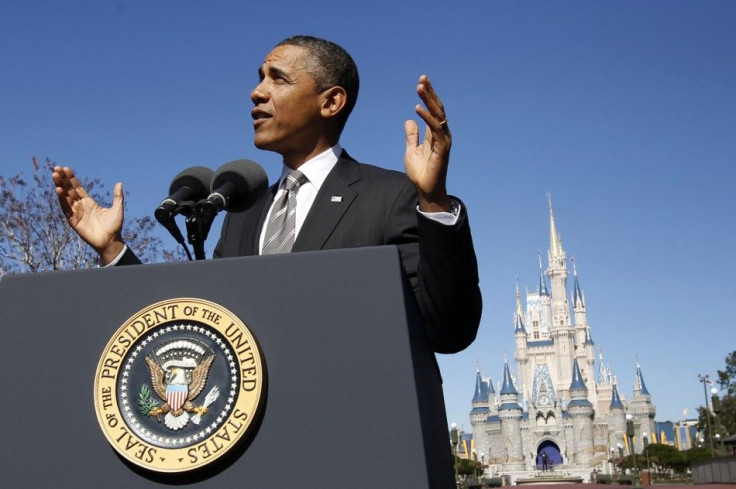Obama Pushes 'Buffett Rule': Raise Taxes On Rich To At Least 30%

The White House is pushing a plan named for billionaire investor Warren Buffett that would raise income taxes on wealthy Americans to at least 30 percent, with President Barack Obama to stump for the proposal in a Florida campaign speech.
Obama on Tuesday was to make his case for the Buffett Rule -- inspired by the investor's oft-repeated lament that his tax rate is lower than his secretary's -- at a college in Boca Raton, Fla.
Florida is among a handful of states that will be pivotal in deciding November's presidential election.
Obama's campaign trip follows data from the White House economic team that 22,000 households reporting more than $1 million in income in 2009 paid less than 15 percent in income taxes, while 1,470 households paid no tax. The rich can avoid higher tax rates if their income is derived from investments and capital gains, which are taxed at 15 percent.
A minimum income-tax rate of 30 percent would bring in an estimated $47 billion, the White House said in its proposal.
The president thinks as a matter of fairness that we should do away with that and that millionaires and billionaires should pay at a rate that's not lower than secretaries or other folks who are just trying to make ends meet, White House spokesman Jay Carney said Monday.
This administration's push is a prelude to an expected vote on the Buffett Rule in the U.S. Senate on April 16, a day before this year's deadline for Americans to file their federal income-tax returns. With Republican aversion to tax increases, the Buffett Rule is likely dead on arrival in the Senate, turning the proposal into a political weapon for each party in the 2012 elections.
Democrats have scheduled the vote to put Republican senators on record during a year when control of the Senate is in play. Obama's re-election campaign will use the tax-fairness argument to clobber his likely November challenger, Mitt Romney, who released tax returns for 2010 showing he paid an effective rate of 13.9 percent on $21 million of income.
Romney is a beneficiary of a broken tax system and he wants to keep it that way, Obama campaign manager Jim Messina said Monday, according to the Associated Press.
The politics of the Buffett Rule can cut both ways. Republicans have dismissed it as a tax increase that would do little to address the U.S. budget deficit and bleed small businesses dry. Rep. Paul Ryan, chairman of the House of Representatives' Budget Committee, called the rule budget pixie dust that would cover just 6 percent of Obama's proposed deficit spending.
Romney's campaign issued a statement calling Obama the first president in history to openly campaign for re-election on a platform of higher taxes.
He has already raised taxes on millions of Americans, but he won't stop there. He wants to raise taxes on millions more by taxing small businesses and job creators, the statement said. We appreciate the Obama campaign reinforcing Mitt Romney's platform of lowering tax rates across the board in order to jump-start this bad Obama economy.
Even Obama's predecessor George W. Bush, who is largely responsible for the tax cuts allowing some people in Buffett's class to pay less than 30 percent on their income, weighed in.
The ex-president, in a New York City conference Tuesday sponsored by his think tank, the Bush Institute, repeated a familiar refrain from his time in office: Raising taxes on the rich impedes job creation.
If you raise taxes on the so-called rich, you're really raising taxes on the job creators, Bush was quoted as saying by the Wall Street Journal. And if the goal is private-sector growth, you've got to recognize that the best way to create that growth is to leave capital in the treasuries of the job creators.
Bush spearheaded the current 15 percent rates on capital gains and dividends, which used to be taxed, respectively, at 20 percent and the ordinary-income rate (now 35 percent).
© Copyright IBTimes 2025. All rights reserved.




















